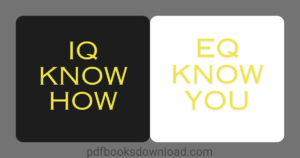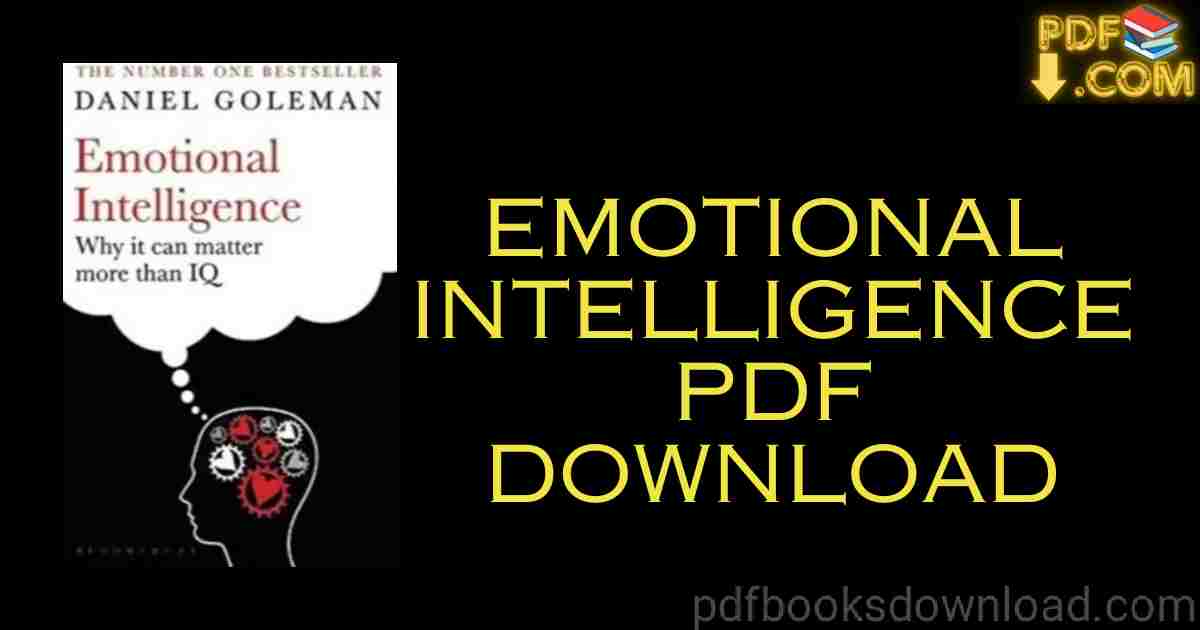| Name of Book | Emotional Intelligence |
| Author | Daniel Goleman |
| PDF Size | 2.5 MB |
| No of Pages | 386 |
| Language | English |
Five Reasons To Read Emotional Intelligence Book PDF
Understanding Yourself Better: Goleman’s book provides insights into self-awareness and self-management, helping you understand your own emotions, reactions, and motivations better.
Improving Relationships: By learning about emotional intelligence, you can enhance your interpersonal skills, leading to healthier and more fulfilling relationships both personally and professionally.
Enhancing Leadership Abilities: Emotional intelligence is crucial for effective leadership. Goleman discusses how leaders can leverage emotional intelligence to inspire and motivate others, leading to greater success in their roles.
Managing Stress and Challenges: Goleman offers strategies for managing stress and handling difficult situations with resilience and composure, empowering readers to navigate life’s challenges more effectively.
Increasing Empathy and Compassion: Developing emotional intelligence fosters empathy and compassion towards others, leading to better communication, collaboration, and understanding in all aspects of life.

Emotional Intelligence Summary
Introduction
In a world driven by intellect and skills, the concept of emotional intelligence (EI) stands out as a powerful force. In his groundbreaking book “Emotional Intelligence,” Daniel Goleman explores the deep impact of EI on personal and professional success.
Through insightful research and practical examples, Goleman demonstrates how understanding and harnessing emotions can lead to greater happiness, stronger relationships, and enhanced performance.
Understanding Emotional Intelligence
Goleman starts by saying emotional intelligence is about knowing and controlling our own feelings and also understanding and impacting how others feel.Unlike traditional measures of intelligence, such as IQ, EI encompasses a broader set of skills that are essential for navigating the complexities of human interaction.
The Four Components of Emotional Intelligence
Goleman identifies four key components of emotional intelligence:
Self-awareness: Self-awareness means knowing and understanding your feelings, what you’re good at, what you need to work on, what’s important to you, and what you want to achieve. Self-aware individuals are in tune with their inner thoughts and feelings, allowing them to make more informed decisions and take proactive steps toward personal growth.
Self-management: Self management means being able to control your feelings, actions, and urges in different circumstances. Self-managed individuals exhibit self-control, resilience, and adaptability, enabling them to effectively cope with stress, overcome challenges, and achieve their goals.
Social awareness: The ability to empathize and understand the emotions, needs, and concerns of others. Socially aware individuals possess a heightened sense of empathy, compassion, and interpersonal sensitivity, fostering deeper connections and more meaningful relationships.
Relationship management: The ability to communicate, influence, and manage relationships effectively. Individuals with strong relationship management skills excel in conflict resolution, collaboration, and teamwork, fostering a positive and supportive environment for themselves and others.
The Importance of Emotional Intelligence
Goleman presents compelling evidence that EI is a better predictor of success in various domains, including leadership, relationships, and overall well-being, compared to cognitive intelligence alone.
The Role of Neuroplasticity
The book explores how the brain can be trained to improve emotional intelligence through intentional practices and experiences. This highlights the potential for growth and development in this area, regardless of one’s starting point.
Practical Applications of Emotional Intelligence
Leadership: Effective leaders possess high levels of emotional intelligence, allowing them to inspire, motivate, and empower their teams. By cultivating trust, empathy, and collaboration, leaders can create a culture of innovation and excellence.
Education: Educators play a crucial role in fostering emotional intelligence in students. By teaching social and emotional skills alongside academic content, educators can help students develop the resilience, empathy, and self-awareness needed for success in school and beyond.
Relationships: Emotional intelligence is very important for creating and sustaining strong connections with others. Whether in personal or professional settings, individuals who prioritize empathy, communication, and mutual respect are better equipped to navigate conflicts, build trust, and foster intimacy.
Well-being: Emotional intelligence is closely linked to overall well-being and mental health. By prioritizing self-care, stress management, and emotional regulation, individuals can cultivate resilience, optimism, and a sense of fulfillment in their lives.
Conclusion
In “Emotional Intelligence,” Daniel Goleman provides fascinating argument for the importance of emotional intelligence in today’s fast-paced and interconnected world. By understanding and cultivating our emotional intelligence, we can unlock our full potential, lead more fulfilling lives, and create a more compassionate and empathetic society. Whether you’re a leader, educator, parent, or simply someone seeking personal growth, this book offers valuable insights and practical strategies for harnessing the power of emotions to achieve greater success and happiness. For more information click.

About The Author Of Emotional Intelligence
Daniel Goleman is an American psychologist and author known for his groundbreaking work on emotional intelligence. Born on March 7, 1946, in Stockton, California, he grew up with a keen interest in understanding human behavior.
Goleman pursued his education at Amherst College, where he earned his bachelor’s degree. He continued his studies at Harvard, obtaining a Ph.D. in psychology. During his time there, he became fascinated by the emerging field of emotional intelligence and its potential impact on personal and professional success.
In 1995, Goleman published his book, “Emotional Intelligence,” which became a worldwide phenomenon. In the book, he explores the importance of understanding and managing emotions in both individuals and organizations. Goleman’s research challenged traditional notions of intelligence, suggesting that emotional skills are just as crucial, if not more so, than intellectual abilities.
“Emotional Intelligence” became a bestseller, translated into over 40 languages, and cemented Goleman’s reputation as a leading expert in the field. He went on to write several other books on related topics, including “Working with Emotional Intelligence” and “Social Intelligence.”
Beyond his writing, Goleman has lectured around the world and consulted with businesses, schools, and healthcare organizations on the practical applications of emotional intelligence. He has also contributed to numerous scientific journals and popular publications, furthering the understanding of human emotions and behavior.
Throughout his career, Daniel Goleman has remained dedicated to helping people harness the power of emotional intelligence to lead more fulfilling lives and create healthier, more productive communities. His work continues to inspire individuals and organizations to prioritize the development of emotional skills for personal and professional success.
Emotional Intelligence Book PDF Related Books
Don’t Believe Everything You Think PDF Joseph Nguyen Free Download
FAQ’s About Emotional Intelligence

What is the main idea of Emotional Intelligence ?
Emotional intelligence, as defined by Goleman, is the ability to recognize, understand, and manage our own emotions, as well as to recognize, understand, and influence the emotions of others.
Why is emotional intelligence important?
Emotional intelligence is crucial for personal and professional success as it affects how we manage behavior, navigate social complexities, and make personal decisions that achieve positive results.
What are the key components of emotional intelligence?
Goleman identifies five key components of emotional intelligence: self-awareness, self-regulation, motivation, empathy, and social skills.
How can one improve their emotional intelligence?
Improving emotional intelligence involves developing self-awareness through practices like mindfulness, learning to manage emotions effectively, fostering empathy by understanding others’ perspectives, and honing social skills through practice and feedback.
Can emotional intelligence be learned?
Yes, according to Goleman, emotional intelligence can be learned and developed over time through self-awareness, self-regulation, empathy, and social skills training.
What are some examples of emotional intelligence in practice?
Examples of emotional intelligence in practice include effectively managing stress, resolving conflicts peacefully, communicating empathetically, and inspiring and motivating others.
How does emotional intelligence relate to leadership?
Emotional intelligence is a critical factor in effective leadership, as it enables leaders to understand and manage their own emotions and those of others, build strong relationships, and inspire and motivate their teams.
Is there a connection between emotional intelligence and mental health?
Yes, research suggests that higher emotional intelligence is associated with better mental health outcomes, including reduced levels of stress, anxiety, and depression.
Does emotional intelligence impact relationships?
Absolutely. Emotional intelligence plays a significant role in building and maintaining healthy relationships by fostering empathy, effective communication, and conflict resolution skills.
How has the concept of emotional intelligence been received by the scientific community?
While some aspects of emotional intelligence have been subject to debate and criticism, the overall concept has gained widespread recognition and acceptance within the scientific community as an important factor in human behavior and success.
Thank You! Dear Reader 💖
